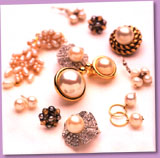

Jeff Stone
interviewed by Mike Agger on August 12, 1996
Related Links
Excerpts from recent Chic Simple books.
Review of "Chic Simple Eyeglasses."
Introduction to Chic Simple.

"I used to wake up in the middle of the night and worry about producing great literature, but now when I wake up I worry about black dresses and what do they really mean? It's all really fascinating when you think about it."
Jeff Stone helped launch a literary revolution in America when he co-founded the Vintage Contemporary Series of paperback books; they positioned very good writers in an unprecedented manner. After filling an executive position with Bantam Doubleday Dell, he established an independent book production company called Chic Simple.
Tripod: My take on the Chic Simple books is that they provide the lifestyle information one would have received from a particularly elegant set of parents. Who reads your books? Who do you write them for?
Jeff Stone: I think you just hit it. A lot of this information would have been passed on through families, but we are part of a fragmented generation of families. For example, the children of the counterculture turned our backs on a lot of information. What did we care what our parents thought about ties or porcelain if they also felt Vietnam was OK? As a result, there are these funny holes in our cultural information where we may know some things but not others.

JS: The new joy that pushes each book along is constantly refining our system of giving information. Every book has become more sophisticated in this way. Our newest book is called "Work Clothes," and it discusses casual dressing in the work place. It presents information in a multitude of ways. I was just looking through it -- and it has icons, FAQs, crisp imagery, dense back matter. I was very pleased with how much was going on that the reader might not even be aware of.
Tripod: The Chic Simple books are ultimately about products, and the products we choose to buy broadcast a lot of messages about who we are. So I imagine that you're finding more and more that your books are becoming entangled in these philosophical questions like, "What does it really mean to wear jeans, a fabric that once had a strong connection to counterculture, to work?"
JS: You are smart to hit on that because I am just realizing it. At first, our books talked about how you did not need a bunch of stuff. For example, in one book we juxtaposed a picture of a Cartier Tank watch with a Timex Mercury watch. One was $30, the other was $3,000, but we felt that both were equally cool and equally well designed. We weren't saying the expensive one was better. A lot of people criticize us for glorifying commercialism, but I think Chic Simple deals in an honest way with the world we live in, a world which celebrates material objects. People have this twisted way of pretending that none of this is intellectually important. Come on! Except for the Unabomber, what are 99.9% people walking around are concerned about? Buying stuff. I have just started to stumble onto the fact that what we actually do is create guide books for the world we live in.

JS: Our parents rejected some of this knowledge in the 50's under the guise of time saving. After the World War II, the development of suburbia coincided with the development of time and labor-saving devices like the washing machine. Social scientists were very concerned about what people were going to do with their lives when the work week was shortened to three days. No one was going to be working because the machines would take care of everything. This belief in time-saving technology propelled polyester clothes and the rejection of cotton and natural fabrics. Why have cotton sheets when there were these new miracle sheets which did not need ironing? Why learn how to cook when excellent frozen dinners were available?
Tripod: A style of life encapsulated on "The Jetsons."
JS: Exactly. That was what we were all going to have. Life was a pill and a button. Why is it, if someone says, "Let's go to this place to eat, it's like food that your mom used to cook," you reply, "Are you kidding?" You want food like your grandmother used to cook, not what your mom cooked. And this made me start wondering about this huge hole in our cultural knowledge and where it might have come from. It would seem that our parents were seduced by this utopian, anti-Luddite dream.
Tripod: Chic Simple is involved in this process of rediscovering detail. For example, it takes a lot of time to develop an elegant wardrobe or a functional kitchen, but these things are what add texture and pleasure to your life.
JS: You're right. So what we do now, as a society, is that we may have take-out six nights a week, but on the seventh day we make a really good dinner and have some friends over. What our parents rebelled against was the drudgery factor of making elaborate meals night after night. We now approach it more, as you say, as a detail, as a way to add texture.
Tripod: We also choose to do these things. That element of choice seems crucial.
JS: Exactly. And this is one reasons the books came to be. There are so many choices and these books act as a sorting system.
Tripod: What is Chic Simple going to do in the future? What gaps in knowledge are you trying to fill in now?
JS: Martinis.
Tripod: A whole book on the Martini?
JS: Well, I think we're going to do a book on entertaining. When you look at the paradigms that are out there right now, Martha Stewart being the best example, you see how there has been this whole industry created out of trying to make people feel comfortable about entertaining. It will be really fun because you get to hit all sorts of cultural weirdness. What does fondue mean? What does grilling mean? People grill so much now that they do not think about it. Another book I want to do would discuss after-dinner rituals, from brandy and cigars to canasta to whatever.
JS: It's laughable, but at the same time that's what's fun, the fact that we don't take our books too seriously. You know, it's kind of funny. I used to wake up in the middle of the night and worry about producing great literature, but now when I wake up I worry about black dresses and what do they really mean? It's all really fascinating when you think about it.
Read excerpts from recent Chic Simple books.
Read a review of "Chic Simple: Eyeglasses."
